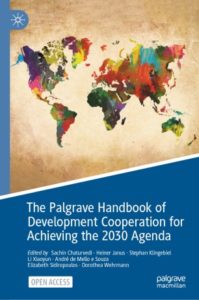
How can different approaches of development cooperation be better reconciled to achieve the Sustainable Development Goals (SDGs)? This is the main question addressed in a new handbook published by Palgrave this month and edited by the Network of Southern Think Tanks (NeST, Sachin Chaturvedi, Xiaoyun Li, André de Mello e Souza, Elizabeth Sidiropoulos) and DIE (Heiner Janus, Stephan Klingebiel, Dorothea Wehrmann). The 2030 Agenda does not determine how and whether different forms of cooperation can be aligned across regions to achieve the SDGs. To identify the resulting gaps and potentials for improving coordination the handbook introduces the new concept of “contested collaboration”.
The 33 chapters written by 45 researchers with different disciplinary backgrounds and from different countries investigate different forms and concepts of cooperation (e.g. South-South Cooperation), narratives and norms, measurements of development cooperation, institutions and non-state actors as well as connections between national priorities and the SDGs. The handbook sheds light on transformations within established forms of cooperation (e.g. the UN System) but also on new actors (e.g. the New Development Bank). It contributes to a better understanding of the resulting coordination challenges and potentials for developing policies geared towards achieving the SDGs. The handbook further identifies opportunities to improve the effectiveness of the global development cooperation architecture and classifies them also by considering global processes. Research for this handbook formed part of the BMZ-funded project “Role and effectiveness of development cooperation to achieve the 2030 Agenda”. The open access ebook of the handbook is already available and a print version will be published in January 2021.
Schreibe einen Kommentar